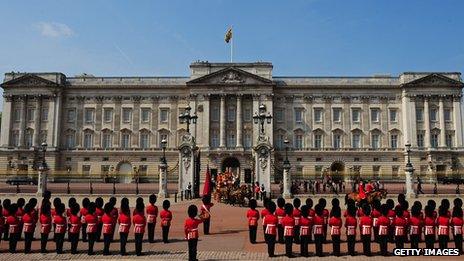Analysis: The Royal Family's history of legal action
- Published

Occupants of Buckingham Palace have, in the past, displayed a litigious streak
It's official: William and Kate are to sue Closer, the French magazine which published topless photos of them on holiday, under France's strict privacy laws.
After the fury with which St James's Palace condemned the publication, the move was inevitable.
But it is not unprecedented.
On several occasions in the last 30 years, the Palace has taken legal action against newspapers or action to prevent personal information being published. Only once has a case actually come to trial.
On every other occasion the Palace has accepted an out-of-court settlement.
The case that came to court involved Princess Margaret's son, Viscount Linley - coincidentally the owner of the French chateau at which William and Kate were staying when they were photographed this summer.
In 1990, he sued the now-defunct newspaper Today for libel after it accused him of rowdy behaviour in a pub: He won £30,000 damages.
The Queen has twice sued the Sun for breach of copyright.
The first time was in 1988, when relations between the royals and the tabloids were particularly bad.
The paper reached an out-of-court settlement after publishing a stolen photograph showing Sarah, Duchess of York and her daughter, Princess Beatrice, which the royal family had planned to use on their Christmas card that year.
The second time was in 1993 - when royal-tabloid relations were just as bad - when the paper paid £200,000 to charity in an out-of-court settlement after publishing a leaked text of the Queen's Christmas broadcast.
That same year Princess Diana started legal action against the Daily Mirror when it published photographs taken with a hidden camera of her exercising in a gym.
The paper apologised and reportedly paid Diana's legal costs of £1m plus a further £200,000 to charity.
But the gym owner refused to settle, caving in only in February 1995, a week before the case was due to start.
He apologised and gave up the £300,000 he had made from selling the pictures.
'Clear invasion'
On that occasion the Palace claimed a breach of confidence by the owner. The law of confidence - until recently, the closest Britain came to a law of privacy - has been the route most frequently taken when the royals have resorted to the courts.
Information obtained in confidence - for instance, by an employee - should remain confidential; if it does not, there are grounds for legal action.
So in 1995, the Prince of Wales was able to seek and get an injunction barring a former housekeeper from publishing her memoirs in this country (they sold 100,000 copies in the US).
And in 2003, the Queen got an injunction to prevent the Daily Mirror publishing further stories about time spent by its reporter, Ryan Parry, as a below-stairs servant at Buckingham Palace.
What's different on this occasion is that the royals are suing explicitly for invasion of privacy - something you could not do in the British courts until quite recently.
But, while France has a clear privacy law which makes publication of photos taken on private property both a criminal and a civil offence, it also has a clutch of successful celebrity magazines which often simply ignore the law.
Lawyers in France say Closer is evidently in breach.
Low damages
"It's clearly an invasion of privacy because the royal couple was on vacation and they had a legitimate expectation to take the vacation privately, without the invasion of cameras from outside the chateau where they were staying," according to Christopher Mesnooh, a partner with Field Fisher Waterhouse in Paris.
Thomas Roussineau, a lawyer who specialises in privacy law, said: "The castle is not the street - it is in a private place - and they are intimate pictures."
But both thought the magazine had weighed up the potential cost of damages or a fine against the revenue the pictures would bring from extra magazine sales and syndication of the photographs themselves and concluded it was well worth running the risk of a court case.
That's because fines and damages in privacy cases, once high, have come down in recent years.
According to Roussineau, the magazine can expect a fine of about 30,000 euros.
As for what the Duke and Duchess can expect, according to Mesnooh: "In these situations the damages are low: several thousand euros, perhaps 10 to 15,000 euros in extraordinary cases."
- Published14 September 2012
- Published14 September 2012